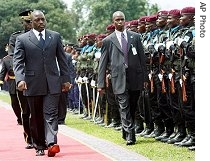The Democratic Republic of Congo's newly elected leader, Joseph Kabila, is trying to figure out how to form a new government while keeping promises made to various parties during the election period. Some groups say the coalitions and commitments are creating obstacles to the country's political progress. Kari Barber reports from our West and Central Africa bureau in Dakar.
Joseph Kabila was elected as the Democratic Republic of Congo's president in a run-off poll on October 29, after much bargaining with opposition parties to garner their support.

Joseph Kabila reviews troops at start of his inaugural ceremony at Presidential Palace in Kinshasa, 6 Dec 2006
After his inauguration on December 6 he has found reconciling those alliances a difficult task.
Antoine Gizenga was the third-place candidate in the initial round of the presidential election. In an effort to add to his base, Mr. Kabila asked Gizenga to join his alliance of parties in the final round against Jean-Pierre Bemba. Mr. Kabila offered Gizenga the position of prime minister for his support.
But Mr. Kabila has appointed Gizenga to the position of what is called "Informant".
In the DRC's constitution an informant is in charge of identifying the majority parties in the National Assembly. From these parties the president then selects the prime minister who in turn would organize the new government.
Gizenga accepted the position, which still could result in his appointment as prime minister. The veteran politician has up to two months to sort out who represents which party in parliament.
Gizenga says choosing a prime minister and forming the new government will take some time. Many parties contested elections for the new parliament, and many candidates won as independents or members of loose coalitions.
Members of Gizenga's party have said they would like key ministries in the new government and that they hope some of Mr. Kabila's controversial aides will not be included.
Mr. Kabila has been president since 2001 when he was installed by the military after his father was assassinated.
Hubert Efole is part of the RCD, a former rebel movement turned political party. He says the wrangling over election promises and the delay in naming a prime minister is a result of the fragile alliances Mr. Kabila built.
Efole says these complications are to be expected when so many parties are sharing power.
The international community has provided thousands of peacekeepers and hundreds of millions of dollars in aid to help with the election process. The large mineral-rich country has been the cause of repeated regional wars. In his inauguration speech, Mr. Kabila promised to end years of conflict, misrule, and plundering of natural resources.
Related articles
- • Felix Tshisekedi Sworn In as DR Congo President (January 24, 2019)
- • Constitutional Court Declares Tshisekedi Winner of Presidential Election (January 19, 2019)
- • Felix Tshisekedi Vows to Be the President of All Congolese (January 10, 2019)
- • Felix Tshisekedi Elected DR Congo President (January 10, 2019)
- • DR Congo Delays Results of December Election (January 6, 2019)
- • Botswana Urges Joseph Kabila to Step Down (February 26, 2018)
- • No elections in DR Congo in December without electronic voting machines: INEC (February 13, 2018)
- • US Warns DR Congo Against Electronic Voting for Delayed Election (February 12, 2018)
- • Felix Tshisekedi accuses INEC of illegally prolonging Kabila's mandate (October 24, 2017)
- • DRC Seeks Arrest of Presidential Candidate Moise Katumbi (May 19, 2016)
- • Papa Wemba Is Buried in Kinshasa (May 4, 2016)
- • Papa Wemba Awarded Highest National Honor as Thousands Pay Tribute (May 2, 2016)
- • Rights Groups: DR Congo Must Free Pro-democracy Activists (April 13, 2015)
- • Police Open Fire on Crowd Protesting Election Law Change (January 19, 2015)
- • Etienne Tshisekedi Evacuated to Belgium for Medical Treatment (August 16, 2014)
- • Kerry Calls on Kabila to Honor Constitution (May 4, 2014)
- • Kerry in DR Congo for Security Talks (May 3, 2014)
- • DR Congo Takes Chairmanship of COMESA at Summit in Kinshasa (February 26, 2014)
- • DR Congo Honors Nelson Mandela, Hero and Model for Humanity (December 6, 2013)
- • Kabila Congratulates Congo Army for Defeating M23 Rebels (October 30, 2013)
- • DR Congo Eases Process for Starting a New Business (June 3, 2013)
- • Regional Leaders Sign DR Congo Peace Deal (February 24, 2013)
- • The M23 Rebels Want to Overthrow Kabila? Nonsense (November 28, 2012)
- • Protests Against M23 Rebels, Government and UN Spread (November 22, 2012)
- • Thousands Protest M23 Capture of Goma, Turn on Government and UN (November 21, 2012)
- • DR Congo Officials Vow to Defend Goma Against M23 Rebels (November 19, 2012)
- • At high-level meeting, Ban urges political solution to crisis in eastern DR Congo (September 27, 2012)
- • US Cuts Military Aid to Rwanda Over Support to Rebels in DR Congo (July 21, 2012)
- • DR Congo, Rwanda Sign Pact to Fight Rebels in Eastern Congo (July 15, 2012)
- • Police Investigate Former Prime Minister for Corruption (May 14, 2012)







